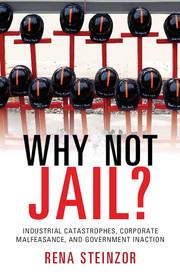Chapter 4 - The Workplace
Published online by Cambridge University Press: 05 December 2014
Summary
BP’s Texas City Refinery
It was typical of them to experience a fire every week, on average. A fire every week is a warning sign that something is critically wrong at the facility.
Mike Sawyer, independent process safety consultant for BPThe question for any company is how good they are at managing through two inevitable barriers: the position paradox and the “check the box” mentality. Texas City is at high risk on these two counts. Position paradox: The people who have the most influence over the decisions that determine the safety and integrity management of a particular site are almost always the most distanced from those conditions. Unless managed, the result is blindness for the senior-most level of the site as well as those above the site. BP as a corporation has had this blindness and Texas City is no exception.
The Telos Group, in a report written before the explosionBP on Tuesday placed the lion’s share of the blame for the deadly blast at its Texas City refinery at the feet of low- and mid-level workers who it said were lax in following written company procedures during one of the most dangerous times in refinery operations. Had the six operators and one supervisor assigned to the start-up of the refinery’s so-called isomerization unit been doing their jobs, the explosion would not have happened … said Ross Pillari, president of BP Products North America.
Anne Belli and Terri Langford, Houston Chronicle, reporting May 18, 2005The 52,000 Gallon Geyser
On March 23, 2005, a massive explosion at BP’s Texas City refinery killed fifteen people and injured 200, 170 seriously. The blast was so forceful that it damaged houses three-quarters of a mile from the plant. Emergency responders ordered 43,000 people in the neighborhoods surrounding the 1,200 acre site to “shelter in place,” meaning that they were directed to go into their homes, seal windows and doors, and remain inside until the all-clear. The incident is considered one of the worst industrial accidents in American history.
- Type
- Chapter
- Information
- Why Not Jail?Industrial Catastrophes, Corporate Malfeasance, and Government Inaction, pp. 105 - 148Publisher: Cambridge University PressPrint publication year: 2014



